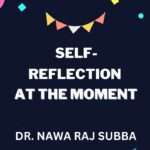Introduction
The author of “Self-Reflection at the Moment,” a new anthology of poems, is a Nepali-writers-in-English. In the foreword, he offered a comment about poetry and creation. These texts express many emotions.
Poetry is a form of communication with the soul
Dr Nawa Raj Subba.

Poetry is something that will not die no matter how much you write. I thought I’d finished everything in six collections of poems, but the poem refused to leave me, so I’m picking up the seventh anthology of poems again.

As the flower of emotion was swinging in my mind, I reminded myself, now, let’s move on to something else. I reasoned that the compositions that would come in the poem were just my repetitions. But poetry is not something that can be written willingly or not. Just as if we are told not to die, we will die, but if we are dead, we will live; that is how poetry is written, as long as we live. I have considered poetry as my pulse. I believe creation to be the soul. If someone tries to meet or touch me, I meet them in poetry; I meet them at the level of the soul.
Themes
During the devastating earthquake in Nepal in April 2015, I had already completed the first half of a collection of poems. In 2021, when the second wave of the Covid-19 pandemic hit Nepal, our situation worsened significantly. The pain of natural disasters and the country’s poor governance compelled me to add a composition that took the shape of the collection. So I thought it would be appropriate to wrap the feeling of a decade in a wreath.
Bal Bahadur’s story is also included in this selection, which is much older than the 2015 earthquake. Its character as a porter may surprise today’s generation. Until the twentieth century, Nepalis had to travel in the mountains primarily by Dhakar/Bamboo basket on the back. Today’s generation has never witnessed brave men! Because motor roads have now reached the villages. Vehicles now transport items that porters used to carry on their backs, such as rice, salt, oil, clothes, and so on. See, for example, a pedal route from Dharan to Sanguri Bhanjyang, the cliff and height of Dhankuta Tekunala, and the summits of Tinjure, Gufapokhri, Gorjatar, and Maiwa Dobhan.
Today, Bal Bahadur, his travel companion Dhakar basket, and Tokma stick disappeared. Bal Bahadur’s geography and appearance, however, have changed. They are currently feeding camels and ploughing the deserts. The colour and scent of those Bal Bahadurs’ toil and sweat remain the same, even though he has abandoned the Dhakers’ loads. As a result, I placed this poem in this collection carefully.
Contents
Since the year 2020, the Covid-19 Corona epidemic has been raging in the world. The second wave came to Nepal almost a year after the first wave. The situation where the patients in the hospital did not get beds and oxygen. People were in pain from the start, and the patients’ pressure made the healthcare system unstable. The political party, the populace, and the government all blamed one another for their failure once it was too late for appropriate treatment and care. The political party in Nepal’s government lacked any theoretical support. Instead of focusing on the rights and interests of the populace, they were preoccupied with the interests of the party, its leaders, and its workers.
As a result, the government got stuck in a quagmire of discord. The people did not find a place to trust and became lonely and helpless. Thus, the country’s existence is in crisis, which added to the concern. In this way, it is natural that the shadow of the uncertain cloud over the country falls on the poem.
Introspection
When the journey of poetry writing reached this point, I introspected. I self-reviewed the effectiveness and sentimentality of my compositions. Thus, I evaluated the thoughts, feelings, and craft expressed in the poem. I also compared my works with contemporary poetry. For that, I put myself on the poet’s wave. I find myself being swept up in the poets’ tidal wave. Poetry symposiums and poets were all unfamiliar concepts to me. I went for a walk around the literary market and the surrounding region. The scholarly atmosphere, like Nepal’s politics, was poisoned. I am sorry that I didn’t find this literary field as sacred as I had hoped when I started writing.
I pursued literary creation and academic studies simultaneously. I read myself through the glasses of anthropology and psychology and turned my eyes to the world. I found a strange fact that no one can understand. During my studies, I found poetry and meditation/Jokhana comparable. Shaman/DhamiJhakri can communicate with the soul or God. To gain supernatural powers and impress others, the shaman performs strange activities. He presents himself in various moods by wearing extra clothing. He has the power of poetry and psychology. While looking at meditation/Jokhana, he enters a semi-conscious and unconscious state. It is the perspective of shamanism, animism, anthropology, and psychology.
Shaman
A shaman squeezes through the culture, psychology, mind, and soul chain. Similarly, a poet stirs emotions in his heart before putting an image into creation. However, the poet’s feelings and attachment to the soul are relatively superficial compared to the Shaman’s insight.
Now let’s comment on the style of poets and artists. An artist prefers to grow hair, while a poet also likes to grow a beard. An artist wants to hang jewelled coils in his ears, whereas a poet prefers to smoke, drink, and sit in a serious posture. Poets and artists’ behaviour appears anti-social in some ways, but they never tire of claiming to show society the way.
Society’s attitude towards poets and artists is more exciting. Society considers poets and artists more as characters or means of entertainment. The market also finds art as a commodity. It also puts poets and artists on the same level. That is why the state also manages the poets and artists by giving them money, prizes, and recognition. The behaviour of the state and society has interfered with the creation of literature and the writer’s role. Today’s market not only ignores poets’ creative talent but also encourages them to write marketable materials. By displaying a lollipop of reward and opportunity, the market players ask the creator to sing or write praises in the name of power and projected character and values.
Comparison
In this way, poets, artists, and creations have become objects today. With money, power, and access, anyone has become a writer by climbing the ladder of the sly creator. Readers today have a hard time distinguishing the real author from the fake author. That is why I cannot trust the literature available in the market today.
There are many questions in my mind that I am constantly searching for answers to. While studying science, literature, culture, anthropology, and psychology, my curiosity has calmed down to a certain level. I also became aware of the source of a certain kind of power while writing poetry. In short, I found the energy and power generated within me comparable to the art and power of shamans. I have no hesitation in this; I am proud. This poetry is akin to a Shaman’s insight. No one likes to compare the power of an ancient character shaman to the poetry of a poet who has received a degree in modern education from a university. But my study and analysis say that the poet is the younger brother of shamans/Dhamizhakri.
Shamanism
Shaman’s poetry, i.e. supernatural power, led to the creation of folklore, folksong, Chant, and culture. Modern literature is based on mythology and folk literature. Therefore, denying the existence of an ancient poet or Shaman, who laid the foundation of contemporary literature, is a sign of ignorance. Ignoring the importance of shamanism in societal evolution also indicates anthropological illiteracy. No one can reach the level of mind, spirit, soul, and God without the spiritual and metaphysical vision or power adopted by shamans.
A shaman performs fruitless deeds and does not expect money and name. Just as a shaman is satisfied when others happily give, I should also be happy with the readers’ wishes. Therefore, the life philosophy of the Shaman and his practice are an attraction, standard, and ideal for me. Shaman’s philosophy of life is one of my favourite ideals.
I also realized that no matter how modern a poet thinks he is, he can never be as great as shamans. The contemporary poet has been able to do only one side of the way the Shaman swims in the soul by playing with emotions at the level of fundamental wisdom. Shaman has selflessly invested his life in society. Today, we only find huts when looking for any village shaman’s house. They do not hope for any position, money, or prestige by singing the songs of any ruler and power. Their guru says that your knowledge does not work for you; it only works for others. Could you not use it to harm others?
Philosophy
That is his life philosophy. But the poet’s pen is self-centred and selfish. Whatever the poet does, he does it for self-pleasure, position, money, and prestige. However, joy, happiness, and selfishness are secondary in the life of shamans. Although the means and practices of the Shaman and poet look similar, their goals differ.
The knowledge of the Shaman comes from the mouth as speech. That is their strength. Their meditation is a sort of service to others. They never know how to use selfish ink. That is why we believe that God has descended on them. Whether one believes it or not, the shaman tradition is hidden in the roots of this society. We poets have only learned a little of him today. To be honest, poets have stolen shaman’s art. That’s why I do not hesitate to short when I consider myself a poet. I have shared this theory in my poems.
Summary
Poems, short compositions, and songs are collected in this poetry compilation. There are depictions of the village and descriptions of the country in this collection of poems. Both natural and artificial disasters have revealed beautiful and distorted thoughts and feelings about life and the world. In the poem, Rasa and Alankar are used from the perspective of Eastern rhetoric. Abhidha, Lakshana, and Vyanjana are found in the word power of poetry. The composition presents existentialist, surrealist, and postmodernist voices and styles from a western perspective. Yet, poetry can also convey life-giving messages.
Some of the works collected in it have already been published in the media. However, in response to comments from readers, I updated it in the anthology. Thank you.
